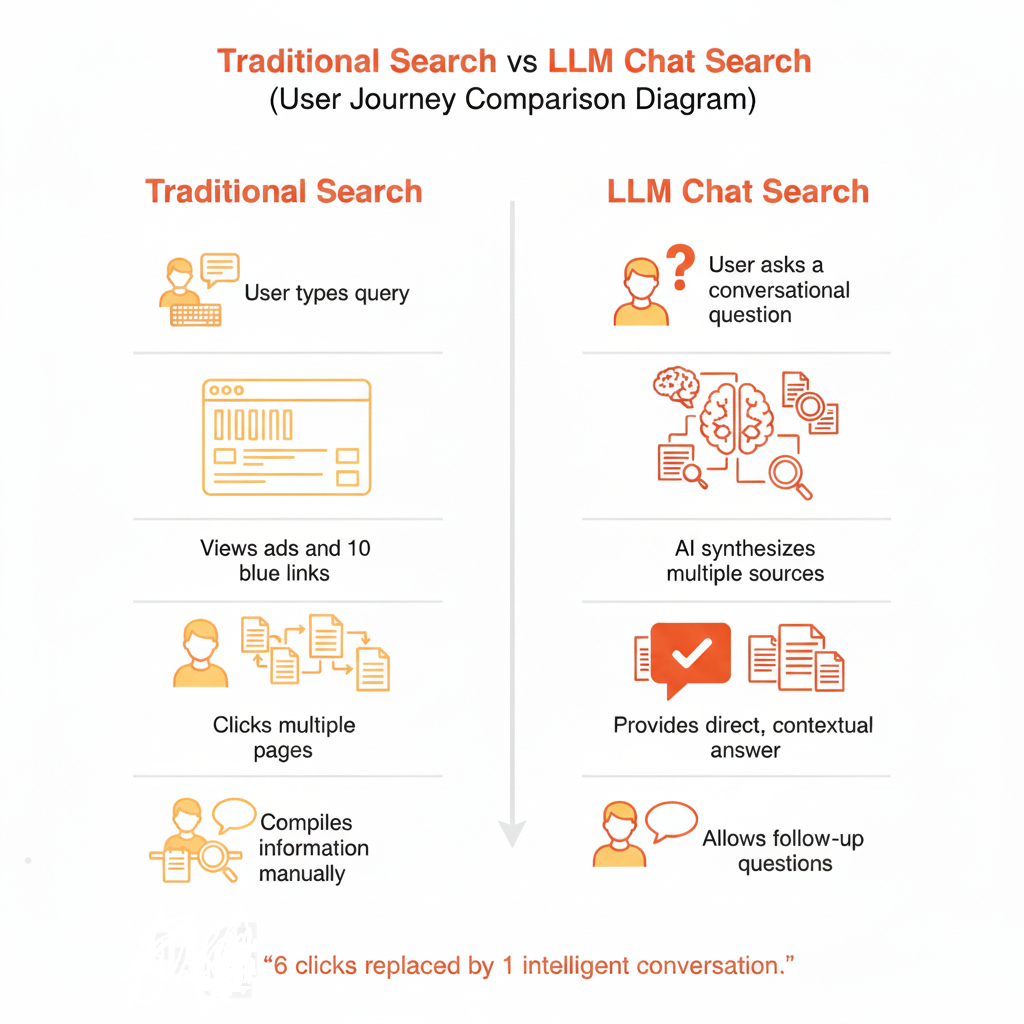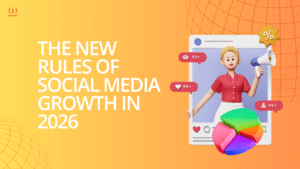The internet is on the edge of a major transformation. For decades, the search bar has been our portal to the web — type a few keywords, hit “Enter,” and sift through pages of links. But now, Large Language Models (LLMs) like GPT-5, Claude, and Gemini are flipping this experience upside down. Instead of searching for information, we’re starting to converse with it.
We’re moving from searching for links to asking for answers. This shift doesn’t just change how we find information—it changes how information is created, optimized, and valued on the internet.
In this article, we’ll explore why LLMs are the new search bar, what that means for businesses, content creators, and users, and how you can adapt before this revolution leaves you behind.
The Evolution of Search Technology
In the early days of the web, search engines were simple: they matched the words you typed with indexed pages. As algorithms improved, search evolved through several eras:
| Era | Dominant Technology | Search Experience | Example |
| 1990s | Keyword Matching | Literal queries | “best pizza in New York” |
| 2000s | PageRank Algorithms | Link-based ranking | Google dominates |
| 2010s | Semantic Search & NLP | Intent-based results | Voice search & mobile queries |
| 2020s | Generative AI & LLMs | Conversational search | ChatGPT, Perplexity, Copilot |
Now, we’re entering the LLM era, where search feels less like typing into a machine and more like chatting with a knowledgeable assistant who understands context, nuance, and intent.
From Keywords to Conversations
Search started as simple keyword matching. You typed “best coffee shops near me,” and Google showed a list of results. Over time, it got smarter with semantic search and machine learning, understanding the intent behind queries.
Now, with LLMs, we’ve entered the conversational era — you can ask, “Where can I find a cozy café nearby that also serves oat milk?” and get an answer that feels human.
Why Traditional Search Engines Are Reaching Their Limits
Search engines rely on indexing and ranking billions of pages, but:
- They often show too many irrelevant results.
- Users must click multiple links to find one correct answer.
- The experience is fragmented and ad-heavy.
LLMs solve this by synthesizing information from multiple sources and presenting direct, coherent answers.
What Are LLMs (Large Language Models)?
LLMs are artificial intelligence systems trained on vast amounts of text data from books, articles, websites, and more. These models learn language patterns, logic, and reasoning to generate human-like text responses.
Think of an LLM as a “knowledge engine” — it doesn’t just find information, it synthesizes it. When you ask a question, it doesn’t look for a matching web page; it constructs a unique answer based on everything it’s learned.
For instance:
- Old search: “Best running shoes 2025” → You get 10 blue links.
- LLM search: “I have flat feet and run 10km weekly; which shoes fit best?” → You get a tailored, conversational answer with recommendations, reviews, and reasoning.
That’s the difference — personalization and depth, not just discovery.
Why LLMs Are Becoming the New Search Bar
So why is everyone calling LLMs the “new search bar”? Here’s the truth: they’re not just replacing how we search; they’re redefining what we expect from search.
1. From Finding to Understanding
Traditional search helps you find information; LLMs help you understand it. Instead of scanning 10 different sites, you can get a well-rounded, contextual explanation instantly.
2. Conversational Interactivity
You can ask follow-ups like, “Can you explain that in simpler terms?” or “What are the risks of that?” — and the LLM will refine its answers dynamically.
3. Multi-Modal Capabilities
Newer LLMs like GPT-5 can process not just text, but also images, audio, and video. That means your future “search bar” might look more like a chat window where you can drop a photo, a PDF, or even a voice question.
4. Context Retention
LLMs remember your session history, creating personalized search flows that feel natural. Google Search doesn’t “remember” your previous questions — ChatGPT does.
How LLM Search Differs from Traditional Search Engines

LLMs don’t just find links—they understand questions and give direct, conversational answers. Traditional search retrieves; LLMs reason and personalize.
| Feature | Traditional | LLM Search |
| Input | Keywords | Natural questions |
| Output | Links | Direct answers |
| Context | Limited | Conversational |
| Personalization | Basic | Adaptive |
In essence, search results are no longer just ranked — they’re generated.
The Impact on SEO: A New Paradigm
The rise of LLMs is shaking up the fundamentals of SEO. For two decades, SEO revolved around optimizing for Google’s crawler. Now, we’re optimizing for AI comprehension.
Here’s what’s changing:
- Keywords Still Matter — But in Context
LLMs prioritize semantic meaning. Instead of “keyword stuffing,” it’s about creating topic clusters and contextually rich narratives. - Content Depth & Authority
LLMs evaluate content based on depth, coherence, and trust signals. High-quality writing backed by expert data will dominate. - Structured Data and Transparency
Including citations, tables, and schema markup makes content more understandable to both LLMs and humans. - AI Summarization Optimization
Your article’s first 200 words might determine whether AI models in summaries quote it — so clarity and factual integrity matter more than ever.
Key Takeaway:
In the world of LLMs, SEO success depends less on gaming the algorithm—and more on writing with clarity, authority, and intent.
Real-World Example: ChatGPT vs Google Search
Let’s compare two real-world queries:
“How do LLMs impact SEO in 2025?”
- Google Search Result: Shows blogs, videos, and LinkedIn posts — you still need to click and interpret.
- ChatGPT / LLM Result: Gives a structured explanation, cites sources, compares strategies, and can even generate a checklist for your SEO plan.
In short, LLMs collapse the research process from hours into minutes.
The Business Advantage: LLMs in Marketing and Content Strategy
Businesses that adapt early to LLM-driven search can reap major benefits:
1. Content Co-Creation
Marketers are using LLMs to co-write blogs, generate ideas, and refine tone, saving up to 60% of production time.
2. Personalized Customer Interaction
AI-driven chat search on websites allows 24/7 customer support, reducing bounce rates and improving conversions.
3. Enhanced Product Discovery
Imagine asking an eCommerce AI:
“Show me eco-friendly jackets for under $150 that match my wardrobe.”
That’s not a search — that’s a conversation with your online store.
How LLMs Understand Context and Intent Better Than Search Engines
Traditional search looks for word matches.
LLMs interpret meaning.
Example:
If you ask, “How can I make my small business rank higher on Google?” A search engine shows SEO guides. An LLM explains on-page SEO, content strategy, and tools — all in one go.
This happens because LLMs use contextual embeddings — mathematical representations of meaning, not just words.
Key Takeaway: LLMs think in meaning, not keywords — unlocking richer, more relevant answers.
How Google and OpenAI Are Competing in the AI Search Race
Google’s Search Generative Experience (SGE) and OpenAI’s ChatGPT with browsing capabilities are racing to dominate the future of AI-powered discovery.
- Google integrates AI answers directly into search results.
- OpenAI offers a “chat-first” model powered by web browsing and real-time updates.
The winner? Likely neither — the ecosystem will merge. In the near future, you won’t choose between “searching” and “chatting” — you’ll just ask, and the system will know how to respond.
The Future of Information Discovery
Imagine a world where you no longer type queries at all. Instead, your AI assistant proactively provides you with the right information before you ask.
This is where predictive search and agentic AI systems come in:
- Your AI will know your habits, calendar, and preferences.
- It will curate content, summarize meetings, and recommend next steps.
- Search will shift from “pulling” information to AI “pushing” knowledge at the perfect moment.
We’re heading toward proactive intelligence—where information finds you.
Key Takeaway:
The future of search is contextual, predictive, and deeply personal—a true fusion of knowledge and intuition.
Key Takeaways: Why It All Matters
- LLMs turn search into dialogue.
- SEO evolves from keyword games to quality storytelling.
- Businesses must optimize for AI comprehension.
- Users gain understanding, not just information.
The way we interact with data is shifting — and those who adapt will lead the next digital revolution.
Conclusion
The search bar, as we know it, is fading. LLMs like GPT-5 are replacing the old query box with conversational interfaces that understand us better than ever before. The implications are massive — for marketers, creators, educators, and anyone who uses the web.
We’re no longer asking search engines for pages — we’re asking AI for answers. And that’s a revolution worth understanding.
At Hunters Digital, we help brands stay ahead in this new era of intelligent discovery. Contact us today — and transform the way your audience finds, interacts with, and connects to your brand in the age of LLM-powered search.
FAQs
No — they’ll coexist. Google is already merging LLMs into its ecosystem through Search Generative Experience (SGE).
They’re improving rapidly, especially with live web access and source citation systems like in ChatGPT and Perplexity.
Create authoritative, factual, structured content optimized for AI comprehension — not just human readers.
Marketing, education, healthcare, and customer support are seeing the biggest gains from LLM integration.
LLM SEO emphasizes depth, clarity, and conversational relevance over pure keyword density.
Tools like ChatGPT for content strategy, SurferSEO, and Semrush AI Insights can bridge traditional and AI-driven optimization.





